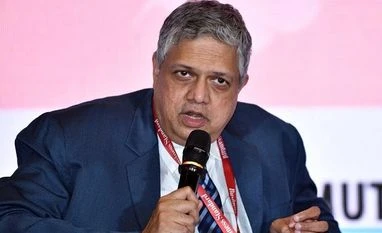The markets have been on a roller coaster ride these past few days. S NAREN, executive director and chief investment officer at ICICI Prudential Asset Management Company, shares in an email interview with Puneet Wadhwa that the biggest challenge they are facing is that investors are increasingly focusing on mid- and small-caps, where valuation is costly. Edited excerpts:
What is your assessment of how the markets have played out these past few weeks?
India possesses one of the most robust structural stories in the world. No other country has such a compelling narrative for the next decade. Given its favourable demographics, coupled with strong long-term growth and improving corporate earnings, the Indian equity market is well positioned. Due to these factors, the market has experienced a steady rally, and valuations continue to remain high compared to global markets.
Moving forward, factors such as geopolitics, commodity prices, global central bank activity, etc., could introduce some volatility. Given the current valuations, we are in a world of moderate returns.
Which sectors, in your opinion, are now most vulnerable to a correction?
The area where we have witnessed the most exuberance is in small- and mid-caps. Investors are predominantly focused on these segments, posing a challenge.
In our framework, there is a boom in small- and mid-caps, which leaves room for a correction in the medium term. The near term is being supported by significant flows.
Another challenge lies in high valuations. In equity markets, positive news and high valuations often coincide, which is the current scenario.
Are investors deferring fresh investment due to high valuations? What advice are you giving to your clients?
Leading investment gurus like Warren Buffett and Howard Marks suggest that investing in undervalued asset classes can yield profits. This is why we have been encouraging investors to consider hybrid strategies in the current market set-up.
Through hybrid investing, one can identify and invest in undervalued asset classes, consequently delivering better risk-adjusted returns over the long term.
Categories such as multi-asset, balanced advantage, equity, and debt or equity savings are all intriguing segments, whether in a booming or correcting market environment.
As a fund manager, what’s the biggest challenge you are facing now with the markets nearing record highs?
The foremost challenge we are encountering is that investors are increasingly directing their attention towards small- and mid-caps, where valuations are high, and less towards large-cap, multi-cap, and flexi-cap strategies, which present relatively safer options given the current market conditions.
Many mutual funds have stopped accepting lump sums in small-caps. What’s your strategy and point of view here?
The significant challenge in small-caps is that this segment has not undergone any redemption cycles since 2008. During periods of redemption, excesses are typically corrected. However, this has not transpired in the small-cap domain. Consequently, the valuations of companies with strong fundamentals, as well as others, have surged rapidly. This is the prevailing challenge of investing in small-caps at this juncture.
Conversely, in the large-cap realm, we witnessed Rs 2 trillion in redemptions, primarily led by foreign institutional investors, resulting in the froth being removed. This, in turn, contributes to a higher margin of safety in the large-cap sector.
How do you anticipate the flow of foreign institutional investment and domestic institutional investment playing out over the next few months?
Factors such as robust growth, favourable geopolitical conditions, resilient corporations, the absence of a banking crisis, a stable macroeconomic landscape, reasonable earnings, and solid earnings growth render India an appealing option compared to other emerging markets.
Foreign portfolio investors view India as a long-term opportunity. While periodic instances of selling may arise, these also serve as opportunities for us to make purchases.
Could you share your insights on the banking, financial services, and insurance sector, as well as the information technology (IT) sector?
Over the past decade, banking is the sole sector where valuations have not surged. Most other sectors have witnessed a valuation increase of 30-40 per cent during this period. Hence, from this perspective, the valuations of banks and financial stocks remain attractive. However, the previous year marked the peak of net interest margins, a low cycle of non-performing loans, and high credit growth.
Regarding the IT sector, systematic investment is prudent at this juncture, given that the near-term appears challenging while the medium-term prospects seem favourable. Nonetheless, there is uncertainty regarding risks in the long term due to developments in artificial intelligence.
What are your main takeaways from the 2023-24 April-June quarter results season? Is India Inc still grappling with a decline in rural demand, escalating wages, and inflation-related pressures?
It’s essential to bear in mind that valuations are not inexpensive. While the results season was satisfactory, most of the outcomes were already factored into the prices.
Unlock 30+ premium stories daily hand-picked by our editors, across devices on browser and app.
Pick your 5 favourite companies, get a daily email with all news updates on them.
Full access to our intuitive epaper - clip, save, share articles from any device; newspaper archives from 2006.
Preferential invites to Business Standard events.
Curated newsletters on markets, personal finance, policy & politics, start-ups, technology, and more.
)